This is the website of Abulsme Noibatno Itramne (also known as Sam Minter).
Posts here are rare these days. For current stuff, follow me on Mastodon
|
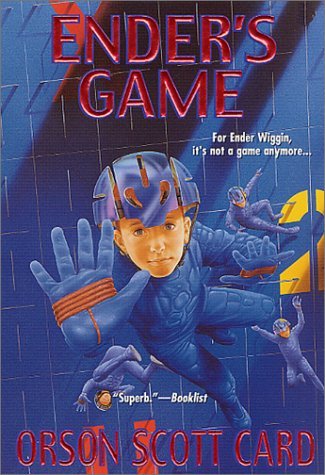 Author: Orson Scott Card Author: Orson Scott Card
Started: 9 May 2009
Finished: 30 May 2009
324 p / 22 d
15 p/d
For Christmas Brandy gave me the most recent book from the Ender universe, but it had been a long time since I had read any of the series, and I hadn’t read all of them, so I decided I needed to reread all of them before reading the new one. So here we go.
For the benefit of anybody who has NOT read Ender’s Game before, I will attempt to be spoiler free, because Ender’s Game is one of those books that has the most power the very first time you read it, if you read it cold with no prior knowledge. The quick summary is that it is about a young kid being trained to be a leader in a big war.
Even rereading it after having read it several times before, many parts of this book resonate with me. Some of the bits about Ender and his family. Some of the bits at the battle school. And then the last two chapters get me in the gut emotionally every time.
This is a classic. If you haven’t read it, you should.
![]()
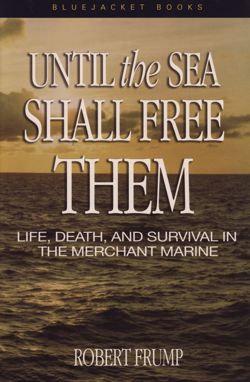 Author: Robert Frump Author: Robert Frump
Started: 24 Jan 2009
Finished: 9 May 2009
341 p / 106 d
3 p/d
So, I finally got around to reading this book… by someone I know, by a person I used to work for… Now, it took three copies of the book to get this far. I think my first was the hardcover, and I’m pretty sure I had it signed by Bob. But during one of my moves it got stuck in storage. Now, eventually I got to one of Bob’s OTHER books in my reading pile, but then realized I hadn’t read this one yet, so I ordered a copy of the paperback. Then I got about a quarter of the way through it, and accidentally put it into a backpack full of some markers and a bottle of water with a loose cap… result, book with blue pages. Now, it dried, and I kept reading it for awhile longer. Then, I lost it. I didn’t know where it was. I waited a few weeks for it to turn up. When it didn’t, I ordered a third copy. Of course, days after the third copy arrived, I found the second copy… but I finished reading using the third copy, since it wasn’t blue.
Anyway, the book itself… I didn’t know what to expect, not having read any of Bob’s books before.
This is basically the story of a marine disaster, and the investigations which followed, eventually leading to some reforms in the American Merchant Marine fleet. The first part of the book is the tale of the sinking of the Marine Electric. Bob draws out the stories of not just the crew aboard the ship, but their families as well. As the story unfolds, he brings in stories of earlier incidents as well. At times these can be very poignant. After this, the book transitions into the drama of the investigations into what happened, basically indicting most of the American Merchant Marine industry, and the government agencies that regulated it for extremely lax safety practices.
Bob tells a compelling story and pulls you through the events. And teaches you a bit as you go. I certainly didn’t know any of this history before I read the book. :-) If there were two things I would say on the flip side… one would be that by the fourth or fifth time there was a “but this was not the first time this had happened, there was also the case of the SS Magoo in 1953” I could almost hear Wayne and Garth doing the little sparkly back in time memory thing… and second would be that when I read “In a conversation with the former Philadelphia Enquirer reporter…” I am not fooled. I know that is you Bob. Might as well break out the first person at some point. :-)
Anyway, good interesting book on a topic I have not read about in the past. I look forward to… eventually… catching up on Bob’s other books as well.![]()
[2009 Dec 5 20:18 UTC – Fixed typo in start date]
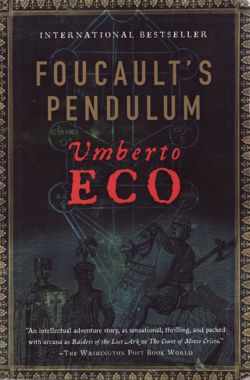 Author: Umberto Eco Author: Umberto Eco
Started: 30 Nov 2008
Finished: 24 Jan 2009
623 p / 56 d
11 p/d
(As translated from the Italian to English by William Weaver that is.)
This is the kind of book that has a reputation as being the kind a lot of people start, but most don’t finish, because it is difficult and inscrutable. So of course I wanted to try it out. Reading the first chapter, I firmly believe that it is intentionally constructed in such a way as to put off readers, and encourage all but the most dedicated to stop there. Not that there is anything particularly DIFFICULT about the reading, it is just a guy having very scattered seemingly random thoughts while wandering through a museum… with all sorts of references to all sorts of things that a reader may or may not get. It is rather annoying.
But the book does settle down a bit after that and starts to read (mostly) like a regular narrative, although it does use that very annoying method of regularly moving backward and forward in time, with the vast majority of the book being flashbacks from the guy in the museum remembering what has happened that led him to the museum at that time. Annoying. I hate that device when it is used in TV and Movies, and I don’t really like it any more in writing.
Over the course of the novel, the main characters delve into the creation of a huge conspiracy theory involving many of the usual suspects in conspiracy theories. They are making it all up, but as often happens in such things, it takes on a life of its own and trouble ensues.
Some of the conspiracy and historical stuff is actually quite interesting. I found myself on more than a few occasions taking a detour to Wikipedia to look up people, places and organizations that were mentioned to investigate a bit about the real world versions as opposed to what was being depicted. And that was fun.
But a big part of this was a very transparent look at words versus reality, and questions relating to objective reality versus perceived reality, and if saying something and believing it enough makes it true… or close enough to true that it doesn’t matter…. if there is even a such thing as “true” outside of the perceptions of those looking at and talking about things.
Blah, blah, blah, blah. Look, I like those sorts of philosophical conundrums. But it was a bit of a stretch to make it 623 pages long.
The value in this book is in the thinking about the concepts being raised and in the interesting historical bits. In those ways it is interesting. There is fun stuff there for those who are intellectually curious about various aspects of European history, or of philosophical questions about the interrelationships between knowledge, language, perception and reality. Or, to be specific, semiotics, which Eco is a professor of. If you like exploring those kinds of concepts, you will like this. But as a flat out novel with an interesting story for the purpose of entertainment… not as much.
So I guess it depends what you are into. I did like it for the intellectual stuff, but it would have been nice if the story part was a bit more compelling. Am I glad I finally got around to reading it? Yes. I’d wanted to read this for awhile, and now was the time I guess.
Many years ago I read The Name of the Rose, also by Eco, and I must say I liked it better. It has many of the same types of themes and intellectual side trips, but I think the Medieval setting just worked better and the actual story was better…
So if you want to read an Umberto Eco book, I’d go with The Name of the Rose first.![]()
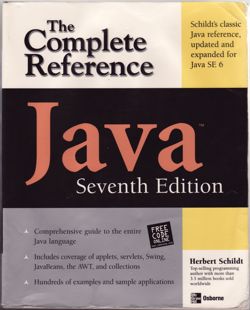 Author: Herbert Schildt Author: Herbert Schildt
Started: 24 Feb 2008
Finished: 30 Nov 2008
1024 p / 281 d
4 p/d
So, this was one of these “I really should read this to improve my knowledge of things relevant to my job” books. I must say, I did an awful job of it. At least in terms of keeping up a decent speed going through the book. Rounded to the nearest whole number, I averaged 4 pages a day. (Really, it was more like 3.6 pages a day.) Sad. It is somewhat typical for when I read books of this type, but of course if I really prioritized it, I would spend more time. The pattern here was to read a few sections one day, then put the book down and not pick it up again for a month. And of course, the way I manage my reading, that blocked any other book reading in the meantime.
I wish I could use the excuse that it was slower because, I didn’t just read, but instead I went through all the examples, tried them on my own computer, made sure I understood exactly what each line of code was doing and why, and that I internalized the syntax and such. I did do that for the first chapter or two… basically the “Hello World” sort of stuff, but after that I rapidly transitioned into a mode of reading for the concepts and for getting a general sense of things rather than the mode I would have needed to be in to finish the book being able to actually sit down at a computer and do much with it.
Having said that, I did manage to get the general overview. It did give me a bit more depth than I had, although probably not as much as I would like. I still have on the agenda for 2009 to actually try to DO some simple Java stuff, going back and using this as a reference guide rather than an overview.
In terms of the book itself, I guess it was a fine overview, organized in such a way as to start with the simple stuff and build up, rather than just as a true “reference”. So it was good for starting from scratch and getting the basics. If there is one thing I would have liked, it would be examples that were more grounded in some sort of real activity… perhaps linking all the various examples to build a toy application of some sort, showing how all the bits could fit together. As it was, many of the examples were things like kicking off two threads and having them count independently, or having a method print its own name, or having a button that when clicked would print a message saying “Button was clicked” or whatnot. Those are fine I guess, but I tend to like examples that seem like they have a point of some sort. They are easier to engage with.
It was obviously not a big page turner though. I can’t say that each evening I’d find myself so drawn to see what was in the next chapter than I’d grab the book and read for hours. Just not that kind of book I guess. At least not for me. :-)![]()
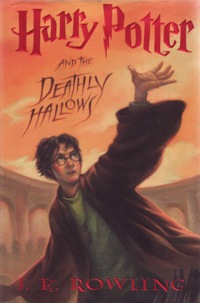 Author: J. K. Rowling Author: J. K. Rowling
Started: 17 Feb 2008
Finished: 24 Feb 2008
759 p / 8 d
95 p/d
So, back in January I read Book 6 and commented that it was a little slow. In the comments to my post Matt offered that Book 7 “moves much faster”. And that is definitely the case. The book starts and then BOOM you get to page 55 and there is massive action and tension which barely ever lets up from there until the end of the book. It sucked me in and this book is one of the major reasons I didn’t get a lot done this last week. I had hoped to get lots of stuff done, but no, each time I had an excuse, I’d go read for a chapter or so instead. I did have the discipline to not just sit and read the whole thing without stopping, although it was tempting. Even so, I ended up averaging almost 100 pages a day, which is rare for me. Not because I can’t read 100 pages a day of course, but because normally I’m busy doing other things and only end up reading for a few minutes a day, which of course slows things down.
One of the things that made a difference here I think, and which sets this book aside from all the other Harry Potter books, is that Rowling almost as soon as the book started ditched the structure which governed all the other books. That structure basically being the structure of the Hogwarts school year. That had provided a certain amount of predictability to all the other books. This time that was out the window. Now, you still had the bit at the end where everything that had gone on is explained and comes together. But that wasn’t too bad.
There are a few bits of how it all came together than I was expecting long before it happened. (Trying to be vague so as not to spoil anyone who has not read it yet.) But there are other things that did indeed take me by surprise. And other things I expected to happen which did not.
All in all a good mix though, and I enjoyed it quite a bit.
It is a shame the series is over. But things did get wrapped up nicely, so I actually hope Ms. Rowling sticks to her guns about it really being over, rather than coming back for another dip and diluting the original seven books.
Having said that, bring on the rest of the movies! This last one will be a doosey if they do it right!
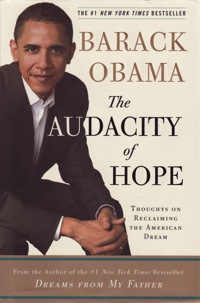 Author: Barack Obama Author: Barack Obama
Started: 20 Jan 2008
Finished: 17 Feb 2008
375 p / 29 d
13 p/d
I finished this a week ago, but am just getting around to posting about it. It was time for a non-fiction book. I had read Obama’s first book back in late April / early May. It was good. But it was mainly about Obama’s youth and search for his roots, etc. This second book is actually about his thoughts on politics. I had wanted to finish reading it before the Washington caucuses, but I didn’t make it. Then I wanted to make it by Super Tuesday. I didn’t make that either. Nor did I make it before the Patomic primaries. But I did finish before Wisconsin. Go me!
Anyway, this was another good book. It did not give super deep insight into specific policies. He has actually been more specific in recent speeches. This was more about his general political philosophy. A lot of the moving beyond left and right, being pragmatic and looking for solutions that work, etc.
I still have a fundamental difference that I struggle with which I have mentioned before. I think he will be a good president in the sense of leadership and tone and changing overall perceptions, etc. But on policy there is probably little I agree with him. Fundamentally, Obama is indeed a believer that government is a good thing, a potential source of solutions, whereas I see it as a necessary evil, to be used only when there is no other choice, and then only reluctantly and in the most limited form possible. And this is independent of “what works”. There may be many cases where a government program would be the most effective way to achieve a goal that I agree with… but being effective does not make it the RIGHT way to solve the problem. Sometimes the right way to solve a problem is not the most efficient way. Sometimes a solution will solve a problem, but do it in a way that requires things that are just wrong to happen in order to make it happen. And then how do you balance that? And sometimes you just have to live with a problem, because the only effective solutions would require doing unacceptable things. It is all about the classic “do the ends justify the means” question.
Sigh. Anyway, if you take as a given that government is not inherently a bad thing, which unfortunately both major parties these days do, then I think the way Obama reasons is very reasonable. He shows a great deal of open mindedness to consider the views of those who disagree with him. And I think this is by far the most critical aspect of Obama that makes him appealing to me, and to many people. And at the same time greatly frightens the left wing of the Democratic party.
The political debate for almost 16 years now has been typified on both sides by the increasing view that the people on the other side are not reasonable people with differing opinions, but rather the people on the other side are stupid, malicious and evil. There was not healthy respectful debate on issues, but rather vilification of those who disagree. This is horribly unhealthy.
Throughout his book, Obama time after time shows respect and understanding of Republican positions on various issues. He talks about some areas where Republicans over the years have done things right and Democrats got it wrong. He talks about various individiuals on the other side of the isle with respect. Not agreement. But respect. He has positive words for Ronald Reagan and George H. W. Bush and a variety of others. He off course has a lot of positive words for a lot of Democrats as well. But it is not black and white. It s not we are good, they are evil.
And there is room for compromise and working together.
And this is a very positive thing. It may drive a few aspects of the Democratic party crazy. Those folks who are saying “No! We need to fight!” And in the end, it may end up being somewhat naive. You of course need two to tango, and unless there are partners on the other side that are also willing to work together, it won’t happen. And of course, when you compromise, you end up with something that isn’t quite what either side wants.
Fundamentally, I’m quite fine with that. I am scared of a world where the left wing Democrats get everything they want just as much as I am of a world where the right wing Republicans get everything they want. We’ve kind of seen the right wing Republican world these last few years. We need to come back to the middle, not swing the pendulum all the way to the other side.
Having said that, despite all the centrist talk, looking at actual policies and such, Obama is VERY liberal. Way too liberal for me on most issues. I am hoping though that combined with his openness toward working with the other side, and the plain realities of how difficult it is to get ANYTHING done in Washington, than what an Obama presidency would actually produce would be closer to the center than the left. And so would be capable of undoing a lot of the damage of the last administration, but without producing TOO MUCH new damage.
I just want to end this though by quoting one passage in the book that made me laugh out loud. It is part of the story of Obama’s first meeting with President George W Bush:
“Come over here for a second,” he said, leading me off to one side of the room. “You know,” he said quietly, “I hope you don’t mind me giving you a piece of advice.”
“Not at all, Mr. President.”
He nodded. “You’ve got a bright future,” he said. “very bright. But I’ve been in this town awhile and, let me tell you, it can be tough. When you get a lot of attention like you’ve been getting, people start gunnin’ for ya. And it won’t necessarily just be coming from my side, you understand. From yours, too. Everybody’ll be waiting for you to slip, know what I mean? So watch yourself.”
“Thanks for the advice, Mr. President.”
“All right. I gotta get going. You know, me and you got something in common.”
“What’s that?”
“We both had to debate Alan Keyes. That guy’s a piece of work, isn’t he?”
And yes, that Alan Keyes *is* a piece of work. Something that even George W. Bush and Barack Obama can agree on with confidence.
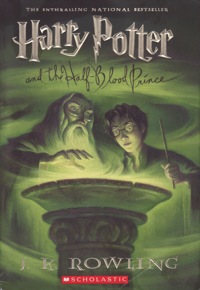 Author: J. K. Rowling Author: J. K. Rowling
Started: 13 Jan 2008
Finished: 20 Jan 2008
652 p / 8 d
82 p/d
So, having just finished the big text book thing, I figured it was time to catch up on Harry Potter. I was two books behind. So Harry Potter Book 6 it was.
It was OK. But I’ll be honest, I was a little disappointed. Now, I read Book 5 in 2005… so it had been awhile and I can’t say my memories for comparison purposes are very good. But it seems like less happened in this one. It was a lot slower paced.
Of course most of that was delving into memories to learn more about Voldemort. And that was all interesting stuff, but it didn’t have the, oh my, I must turn the page right now to find out what happens next sort of quality to it.
And the big thing at the end… unfortunately, by waiting as long as I had before reading it, I had indeed been exposed to a spoiler, despite working very hard to try to avoid it. As I remember correctly, it was a post on BoingBoing talking about a t-shirt someone was selling covered with spoilers of various things, from Rosebud to Who shot JR to Luke’s Father to the ending of Harry Potter Book 6. It really pissed me off at the time, and I think probably reduced the effect of the last few chapters of the books.
Anyway… I’m still looking forward to Book 7. And so far I’m spoiler free.
I averaged a healthy 82 pages per day on this book. Much faster than the textbook before this. :-)
A non-fiction is next. I started it within seconds of finishing Harry Potter last weekend. But I’m letting one non-work non-fiction into the mix before the next work non-fiction. And then maybe I’ll let my next fiction book be the last Harry Potter. :-)
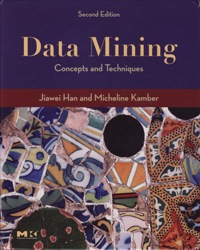 Author: Jiawei Han and Micheline Kamber Author: Jiawei Han and Micheline Kamber
Started: 20 May 2007
Finished: 13 Jan 2008
770 p / 239 d
3 p/d
This is a book that was suggested to me as being useful for work. A textbook that would be useful for work. A long textbook for work. Anyway, I got it and started reading it when the next non-fiction slot in my rotation hit, jumping it ahead of other non-fiction books that were in line.
The first 3 chapters or so went very quickly as they were high level overviews of various things. Starting on Chapter 4 though (Data Cube Computation and Data Generalization) progress slowed down greatly. The content was a bit denser. And the reading a little less fun. Chapter 4 in particular was a subject that I could not get excited about. So I slowed down. I would have to force myself to read more. And that killed my momentum. Chapter 5 and beyond were more interesting again (at least to me) but with me out of the habit of reading regularly I actually changed my evening routine o include a “block” of reading time after my blocks for email and bills, and before my block for genealogy. Now, on an average weekday, I try for two blocks, but often only get one. It is only weekends where I usually get to blocks 3 and 4. So this meant I was only reading this book maybe once or twice a week, for 40 minutes at a shot. Now, this was still faster than I was doing without having a specific time set aside, as I would rarely just get the “Hey, I want to read the Data Mining textbook this evening before bed!” sort of feeling. So this got me going again, although still slowly.
Also of course here, I was just READING, I was not doing the exercises and problem sets in each chapter. So I definitely was not getting everything I would if I had, say, taken a class that actually used this as a textbook. But never-the-less this gave a good overview of concepts relating to Data Mining, much of which is clearly relevant to the kind of things I am responsible for at work. So this is good. Now, do I know each of the concepts back and forth deeply enough to be able to be able to give a presentation on it or explain in detail to others? At a high level maybe, but at a detail level, no. But I am more familiar with all the concepts than when I started. Enough so to know what is being talked about if the concepts come up at work and to talk about them at a high level, and to follow discussions that go deeper. And I know where to look to refresh myself on details if I need them. So that is all good.
I do wish I’d forced myself through this at a faster rate though. That was just a matter of discipline. Taking almost 8 months to read this was a bit much. When actually sitting down and reading, I was running over a page a minute. I just didn’t sit down and actually do that enough. I have to get better at that, because two more similar large non-fiction books for work are coming up soon in my queue. They will be similarly chock full of good information that will be useful for me, and often interesting stuff… but not exactly page turning reading where you just can’t wait to sit down with the book to read the next chapter. So I’ll have to work on that.
I’m thinking that rather than let the next work book take the next non-fiction slot I’ll let one of my other non-fiction books take a slot. So a fiction book, a non-work non-fiction, then another fiction, then the next work-related non-fiction. We shall see.
And when I do the next work-related non-fiction I do have to make myself go faster. Doing this one at an average three pages per day killed my reading for 2007. In 2007 I only finished reading THREE books as opposed to ELEVEN in 2006. And I thought 2006 was actually a horrible year for reading for me. Once upon a time I read much more than I read today, and that is a shame. I need to start increasing that volume. I mean, come on, at LEAST one book a month, right? One a week would even be reasonable, but I think that is out of my reach right now…
Anyway, Data Mining by Han and Kamber… if you are working on Data Mining topics for work or school and need a good overview, grab this. If you are looking for fun reading on the beach… don’t.
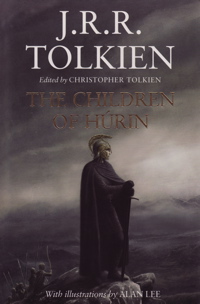 Author: J. R. R. Tolkien Author: J. R. R. Tolkien
Started: 7 May 2007
Finished: 20 May 2007
313 p / 14 d
22 p/d
The title listed in the subject is the real title, used on the title page of the book and in the Library of Congress Cataloging-in-Publication Data section. The “friendlier” title “The Children of Húrin” is used on the cover and other places you see it mentioned… but it is not the real title. So I am using the real title above.
Regardless, this is the “new” Tolkien book… the story itself has been published in several forms in the past, including as a chapter in The Silmarillion. But that was in a more abbreviated “summary” sort of form. This instead is Christopher Tolkien‘s attempt to piece together dozens of drafts of portions of this tale that has father left behind into a single coherent novel form.
As a not all that critical reader and a Tolkien fan, I think he did just fine. This book is much darker than the Lord of the Rings and definitely isn’t quite as accessible and fun as a story. And of course the main character just makes mistake after mistake, leading inexorably to the unhappy ending. But it gives another glimpse into another bit of Middle Earth history.
If you are into Tolkien… especially if you are into him enough that you have read the Silmarillion and not just the Hobbit or The Lord of the Rings, then you NEED to read this book too. If you never were able to get into the Silmarillion, this might be a bit more interesting to you than that was… this really is a novel, which the Silmarillion wasn’t really… so maybe.
But if when reading TLOTR you just never were very interested in the background history of that world and weren’t reading the Appendices at the end of the Return of the King wishing there was even more to read… then you can probably skip this.
Having said that, since I was one of those soaking up every last drop… well, OK, I never got past Book 2 of the 12 volume History of Middle Earth… but soaking up a lot of drops anyway… I did enjoy the Children of Húrin.
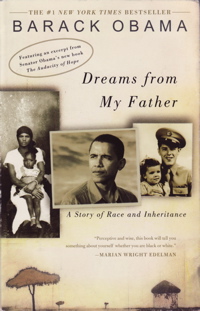 Author: Barack Obama Author: Barack Obama
Started: 15 Apr 2007
Finished: 7 May 2007
457p / 23d
20 p/d
On the plane on the way home from Ohio, I finished the first of Obama’s two books. Both were given to me by the DC branch of my family for Christmas. This is *not* the book where he talks about his political beliefs and politics and such. That is the next one. This one instead is about Barack Obama’s search for his own identity and roots.
In any case, I really enjoyed the book. Barack tells a good story. From the confused youth through to trying to find the right ways to make a difference to his search for knowledge of the father he barely knew. It gives you a portrait of Barack as a person. And he seems like someone you might well want to know. Well… at least later in the book. The teenage and college years Obama I’m not so sure of. :-)
But it was all basically an introspective search for self. I am not sure however that by the end Obama had actually quite figured out who he was yet. He was still patching together clues. The book ends still years before Obama was in the state legislature in Illinois, let alone the more recent experiences in the US Senate and now running for President. There is a lot more to who Obama is and to his biography than can be found in this first book.
But what is in this first book is appealing. There are a lot of warts and imperfections. This is not a glossy idealized Obama. But it still gives an interesting picture that makes you think this is exactly the kind of biography that COULD end up producing a good president. And the wide ranging background and experiences that formed his early years would give a perspective dramatically different from that of any previous president or anyone else running. But in a good way, not a bad way.
Would I vote for this man for President? Well now, that is an entirely different question. I’ll reserve judgement on that for quite a while. At least until I’ve read the second book, most likely even longer. I suspect that while I like him as a person, and think his perspective and background would be useful, and of all the candidates having him rise to the presidency would certainly be the most dramatic and inspiring narrative… I am guessing that when I dive into it many of his actual positions and policies will make it very difficult for me to consider actually voting for him even if he made it to the general election. (Out of principle I refuse to register a party and participate in any primaries.)
Of course, that will also depend who else ends up on the general election ballot, and I’m not talking just about the Republicans. Hopefully this time there will be at least one third party candidate whose views I like and who isn’t a complete nutjob. I can almost never stomach either of the major party candidates. Oh well, we shall see.
Also, I must say I am definitely liking having divided government again. It should always be that way. I’ll probably end up judging the house and senate races individually, but I must say I certainly hope that if the Democrats take the Presidency that the Republicans manage to take back the congress, and if the Republicans keep the White House the Dems keep the congress. It is always trouble when both are in the same hands… regardless of which hands.
Oh, back to the book… Dreams from My Father is very engaging. It kept me interested and turning the pages. Not just from wanting to know more about this guy running for president, but just in wanting to follow the narrative to the next step. It is emotional and a bit melodramatic, but that is OK, I like that kind of thing.
I also like the idea of a Presidential Candidate that is able to do that kind of introspection, of trying to understand his own soul. And being able to openly express it that way. And to speak about it in a compelling manner. You definitely can see the link to his convention speech in 2004. My blog was not up and running that month as I was in the process of moving my stuff from Pennsylvania to Florida and I hadn’t set everything up again, but the next day (28 Jul 2004 at 14:43:38 UTC) I made my first ever mention of Obama in an email to a couple of friends. This is what I said:
Missed it last night, but just watched Obama’s convention speech off the C-Span website. He hit it out of the park. Came off VERY well. I liked him a lot. I’ll go out on a limb and say that he WILL be on a presidential ticket (not saying top or bottom) in 2008 or 2012.
Yup. I’ll stick by that. As I said, not sure if I would vote for him, but if he doesn’t at least make it on a ticket, then I will be very disappointed.
He just generates such excitement in a way I have not seen from a candidate since… um… I was going to say since I’ve been paying attention to politics… but that is not true… there was a similar level of energy and excitement about Ross Perot at the time. Just because he was so different and broke the mold. That is the same sort of feeling around Obama.
Hopefully he doesn’t flame out like Perot did. However many years later I’m still mad at Perot for pulling out just long enough to destroy his chances in 1992 before jumping back in. If he hadn’t done that we might have actually had three candidates with electoral votes and an election thrown into the house. Damn him for spoiling the fun. At least we made up for it somewhat with the fun of the recounts in 2000.
Anyway… I got excited by this book. The Obama candidacy will be really fun to watch. And an Obama presidency would be fun to watch as well if it happened. And he *is* appealing… While I can’t say I’d vote for him… I’m not ready to rule it out yet, and that is saying quite a bit.
|
|
 Author: Orson Scott Card
Author: Orson Scott Card







